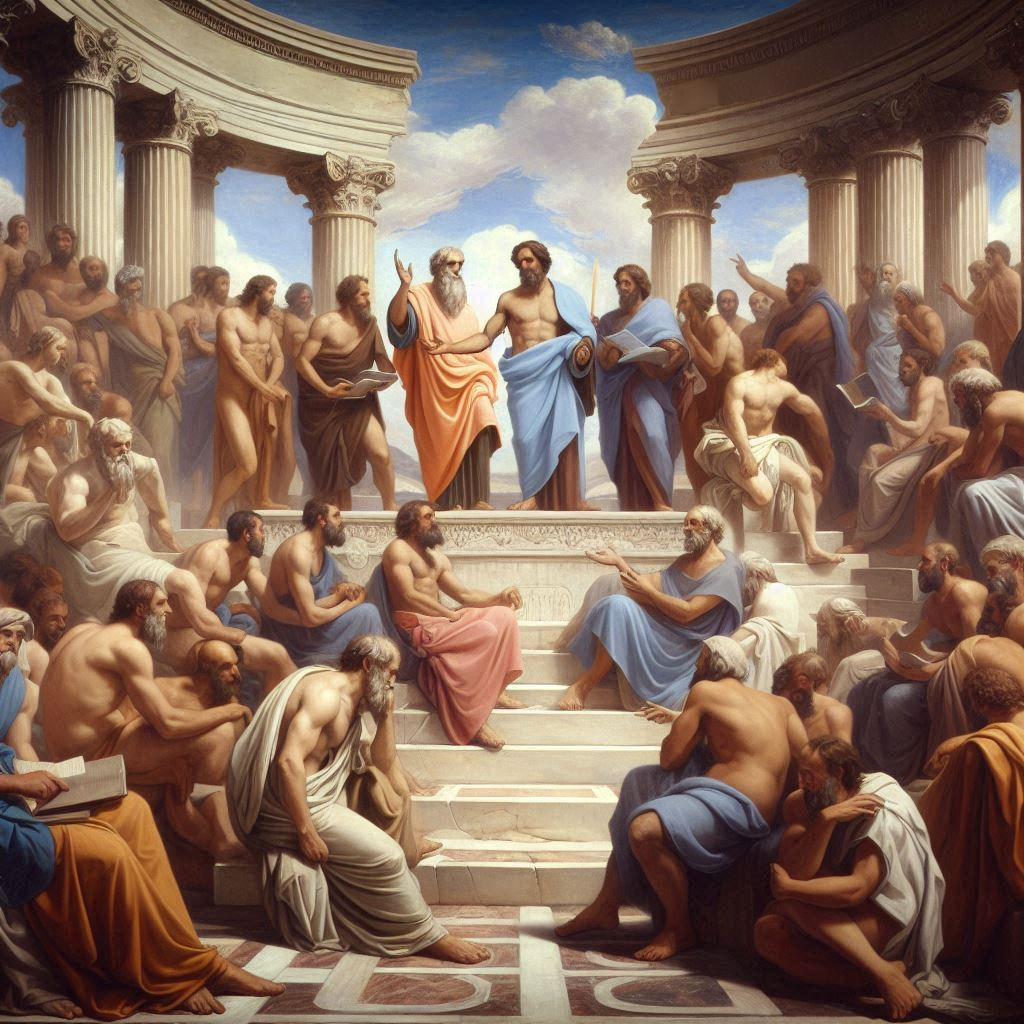The Symposium's Enduring Embrace
Plato's Banquet and the Seeds of Queer Theory
Jump to the Article

Google's AI machine, Gemini, composed this article about Plato's Symposium and how this text relates to modern Queer Theory.
Plato's Symposium, a vibrant record of a philosophical drinking party in ancient Athens, remains a cornerstone of Western thought. While ostensibly about the nature of love (Eros), the text's exploration of desire, gender, and the very concept of "the good" resonates surprisingly with modern Queer Theory. Though Plato's world was vastly different from our own, the Symposium inadvertently lays groundwork for questioning heteronormative assumptions and exploring the fluidity of love and identity.
The dialogue unfolds through a series of speeches praising Eros, each speaker building upon the last. From Phaedrus's celebration of love's divine inspiration to Aristophanes's comedic myth of soulmates and Agathon's poetic flourish, the speeches offer a diverse range of perspectives. However, it's Socrates's intervention, channeling the wisdom of Diotima, that truly ignites the Symposium's potential for queer readings.
Diotima's ladder of love, a progression from attraction to physical beauty to love of the soul and ultimately to love of wisdom itself, challenges the traditional view of love as simply a physical or procreative act. This emphasis on the intellectual and spiritual dimensions of love opens up possibilities beyond the binary of male-female attraction. The focus shifts from the object of desire to the experience of desire, a crucial move that anticipates Queer Theory's focus on the social construction of sexuality.
Furthermore, the Symposium subtly undermines the rigid gender roles of Athenian society. While pederastic relationships between older men and younger boys were common, the text doesn't explicitly endorse them. Instead, it explores the complexities of these relationships, highlighting the potential for intellectual and emotional connection that transcends the power dynamics inherent in the social structure. Alcibiades's dramatic entrance and his passionate, albeit rejected, pursuit of Socrates disrupt the expected dynamic, illustrating the fluidity of desire and the challenges to established norms.
The very concept of "love" itself, as presented in the Symposium, becomes a site of contestation. The dialogue doesn't offer a single, definitive answer to the question "what is love?" This ambiguity allows for a multiplicity of interpretations, mirroring Queer Theory's rejection of essentialist definitions of sexuality and gender. Just as there are many forms of love discussed in the Symposium, Queer Theory recognizes the diverse and ever-evolving nature of sexual and gender identities.
It's important to acknowledge that the Symposium is not a proto-Queer text. Plato and his contemporaries likely held views that would be considered homophobic by today's standards. However, the text's open-ended exploration of desire, its challenge to traditional gender roles, and its emphasis on the social construction of love provide fertile ground for queer readings. By focusing on the relational and experiential aspects of love, the Symposium anticipates later critiques of heteronormativity and lays the groundwork for understanding sexuality as a complex and fluid aspect of human experience.
In conclusion, while the Symposium is a product of its time, its enduring power lies in its ability to spark dialogue across centuries. Its exploration of love, desire, and the search for "the good" continues to resonate with contemporary discussions about sexuality and identity, making it a surprisingly relevant text for understanding the intellectual and philosophical underpinnings of modern Queer Theory.
The banquet may have ended long ago, but the questions it raises about love and desire continue to nourish our understanding of ourselves and our relationships.
